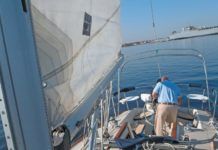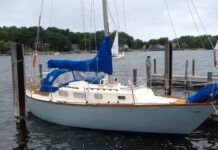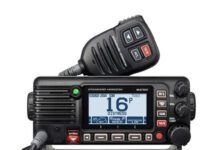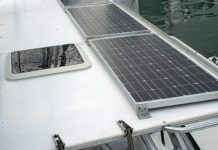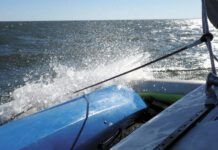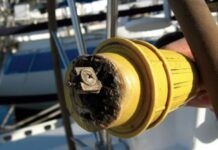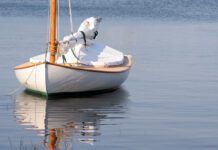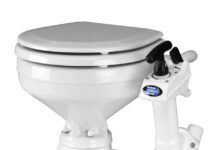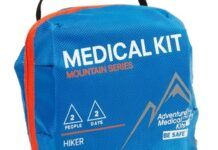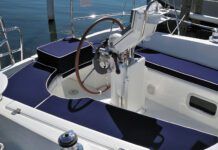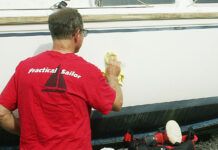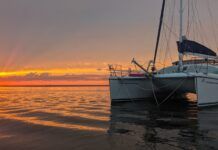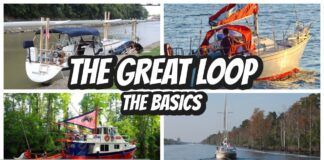It shouldn’t come as too much of a surprise to learn that we at Practical Sailor do a lot of research on the Internet. If we had to assign a number to it, we’d say 70%. There—the secret is out.
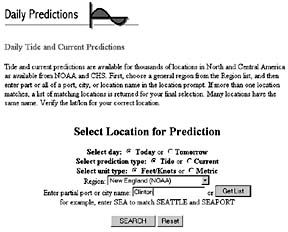
Some websites with the biggest splash are just about worthless, and some with the least splash are incredibly valuable. We’re not sure why that is, but we’d guess it’s because, even today, most people share information because they have it, and not to share it doesn’t do anyone any good, even if there’s no immediate prospect of money at the end of all the work. Many of the best sites are labors of love.
To those who are hesitant about computers and the Internet, or maybe disdain them out of ignorance, or don’t know how to type, or despair when the blasted machines turn blue with dire warnings and error messages, we can only say this: All this is normal, so get on the stick. Olin Stephens can manage it at 92. First-graders can manage it at 6. Don’t get flustered and overwhelmed. It’ll take a few hours to get the drift. They will be some of the more valuable hours you can spend in this millennium.
Every day we get questions from readers who would be far better served (if only because the answers would come quicker) by asking the same question of a decent search engine. Our current favorite is Google.com, but there are others: Altavista.com, Askjeeves.com, and Lycos.com to name a few. Yahoo is a great site for browsing, but isn’t as good for searching.
We won’t waste space here telling you how the computer logic of different search engines differs, or advising you how to search, except to say that the more you search, the better you learn how to search. The words you type into the search boxes make all the difference. Consider how the search engine you’re using sifts the Internet for what you type. Adapt to the logic at hand. If at first you don’t succeed, try a couple more times, varying your approach. Spell correctly. If you don’t find what you’re looking for after two or three thoughtful searches, it most likely isn’t there. That’s rare, we find.
We thought it might be helpful to you to share the URLs of some of the sites that are most valuable to us here at the magazine. The general idea is that all are practical. Well, most are…
Since it’s impractical in many cases to print here all the extensive URLs that will take you exactly to the web page in question, we will in some cases just give you the domain name and then say what to look for when you get there.
General Reference
www.google.com
A few years ago, we all looked for sailing information by referring to huge indexes and lists like Mark Rosenstein’s SailingPage (apparent-wind.com). Today, sites like that are best for browsing and turning up all sorts of great links you never thought of in your focused searching. For focused searching, learn to use Google.
www.anywho.com
Nationwide phone and address listings for individuals and businesses.
Maintenance and Repair
www.yachtsurvey.com
This site belongs to David Pascoe, a surveyor in Florida. He’s a man with a mission, and the articles on his site are generally well worth reading.
www.yachtpaint.com
This is the Interlux website. The site design is a bit too flashy for our taste, but is comprehensive and full of good pointers on paints, preps, and finishes. Follow the link to the Online Boat Painters’ Guide.
www.kop-coat.com/handbook.htm
Fair’s fair. Interlux’s arch rival, Kop-Coat, owners of Pettit and Woolsey, maintain an excellent painting handbook on site. This is a direct link to it.
www.westsystem.com
Follow the links to the user manual – the “primary guide to the handling and basic techniques of epoxy use.” The focus, of course, is on West’s products, but it’s good information across the board.
www.boatdiesel.com
Over the years this has developed into a comprehensive site for all matters diesel. There are some biases, but it’s a great place to begin research whenever you need an overview leading to specifics.
www.ancorproducts.com
Follow the “Technical Information” link to loads of good information on wire and wiring.
www.rigrite.com
A wealth of information on spars and rigging from most of the principal manufacturers, especially useful if you need to spec replacement parts.
www.harken.com
The Harken brothers recognized the value of the Web early on, and their site has perennially been of practical help to sailors. Click on the Tech Tips.
www.neropes.com/splice/
Complete splicing instructions from New England Ropes, covering a variety of rope types and splices.
Boats and Gear
www.sailbuyersguide.com
Sail Magazine maintains the most comprehensive online guide to boats currently in production. Site navigation is database-driven and clunky.
www.sailingworld.com
or
www.cruisingworld.com
Follow the links to the Sailor’s Sourcebook. This is the converse (or inverse) of the Sail Buyer’s Guide—it’s way out-of-date (1999 edition still posted), but is faster and easier to navigate.
www.soundingsonline.com
Still the best nationwide source of boats-for-sale classifieds.
www.boating-industry.com
A very large database of information on marine manufacturing and trade news, aimed at marine professionals, with daily news available on the site and by e-mail.
Design
www.tedbrewer.com
Click the link for Brewer’s definitions and discussions of mathematical concepts and ratios that apply to boats —well worth bookmarking for future reference. Then you can move along to the next site for research:
www.image-ination.com/sailcalc.html
A fascinating page scripted by Carl Adler; allows users to assess all sorts of ratios in a single boat or boat-for-boat by entering numbers (or simply choosing boats). The data is based on input from users, so neither Carl Adler nor PS can vouch for accuracy, but it’s an instructive and entertaining site.
Weather and Tides
www.intellicast.com
While there are scores of excellent weather-related sites, this is a good all-purpose source. Follow the link to marine forecasts.
www.tides.com/tcpred.htm
Tide and current predictions for North America, via NOAA, provided by Nobeltec, the electronic cartography company. Also available in a frame at www.nobeltec.com.
www.nws.noaa.gov
National Weather Service home page. Click on the link for Marine Weather, and follow that to a stunning array of information the government provides for sailing taxpayers.
Community
www.trailersailor.com
Long a nexus of information for trailer-sailors and their boats.
www.goodoldboat.com
Follow the “Resources” link to class associations, owners groups, and contacts for older designs. This is a big, hand-made list, and a pleasure to see in a world of dead-end databases.
Neato Sites
www.maptech.com
Get to know the map server, which includes nautical charts, street maps, and topo maps, and shows lat/long according to your cursor movement. You can preplot the coordinates for your Aunt Harriet’s house in East Overshoe on your handheld GPS. Note: these are served in degrees/minutes/seconds. Convert to decimal minutes by dividing the seconds by 60.
www.ipy.com
The Island Packet Yachts website makes use of a “Cyclorama” function that gives you a seamless photographic view of the interior of a boat through360°. You can control your own tour by keyboard or mouse. This isn’t new tech, but it’s well developed here. Needs a good web connection.
www.onlineconversion.com
Convert just about anything to just about anything else. Again, we can’t vouch for every result here—it all depends on the math that went into the programming. But it’s way cool.
Important Notices
www.navcen.uscg.gov
The US Coast Guard’s Navigation Center. Follow links for GPS status and Local Notices to Mariners.


